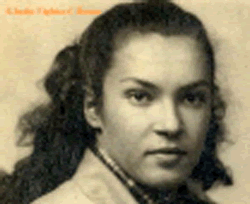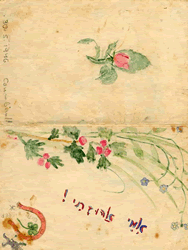Edith Zierer
The Ghetto Fighter’s House mourns the passing of Edith Zierer, pupil of Lena Kuechler-Silberman and a longtime friend of the “House.” The story of her rescue is connected to two people: The first was a young Polish seminarian named Karol Wojtyla (the future Pope John Paul II), the second person was Lena Kuechler-Silberman.

The Ghetto Fighter’s House mourns the passing of Edith Zierer, pupil of Lena Kuechler-Silberman and a longtime friend of the “House.” Edith was born in 1930 in the city of Katowice, Poland. She lost her entire family in the Holocaust. The story of her rescue is connected to two people. The first was a young Polish seminarian named Karol Wojtyla (the future Pope John Paul II) who found 14-year-old Edith, just liberated from a forced labor camp, destitute and frozen in a village railway station. He gave her tea and bread, and then carried her on his back through the snow to another village station where he helped her board a train to Krakow to seek her parents, though in vain.
The second person involved in Edith’s rescue and rehabilitation was Lena Kuechler-Silberman. Edith was fortunate to be one of the hundred children Lena gathered after the Liberation, cared for and took as immigrants to Israel. Lena Kuechler also asked Edith to write a diary about her experiences during the Holocaust. “I will not write anything about my childhood,” wrote Edith in her diary. “In my mind I see everything, all that passed, and it hurts me a lot to think about it. When I dream about where I was yesterday, I still imagine that I am with my parents and my darling [sister] Judit’kah - with whom I had recently fought – how much would I give to be with them and to be with her again!” Because of Edith’s poor health in those days, she could not continue to write in her diary – and so Lena Kuechler signed it off with a note saying, “This diary was stopped because of Edith’s daily fevers, headaches, and her terribly bad moods.” Though Edith stopped writing in the diary, the warm relationship between her and Lena continued for many years.
